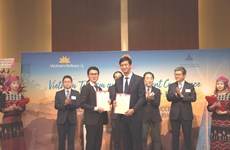Businesses need to raise competitiveness: experts
Policy makers and businesses must keep abreast of the latest
developments in the global economy to ensure local enterprises are
competitive, said Vu Khoan, former Deputy Prime Minister, at a
conference in Hanoi on March 9.
"The world is changing. If we don't change, we will lag behind," he told the seminar, which was looking at how the business environment has changed since the country joined the World Trade Organisation (WTO) five years ago.
Khoan said the current global financial crisis has resulted in profound changes in countries' economic models, particularly regarding external affairs.
"The world is changing. If we don't change, we will lag behind," he told the seminar, which was looking at how the business environment has changed since the country joined the World Trade Organisation (WTO) five years ago.
Khoan said the current global financial crisis has resulted in profound changes in countries' economic models, particularly regarding external affairs.
Policy makers and businesses must keep abreast of the latest
developments in the global economy to ensure local enterprises are
competitive, said Vu Khoan, former Deputy Prime Minister, at a
conference in Hanoi on March 9.
"The world is changing. If we don't change, we will lag behind," he told the seminar, which was looking at how the business environment has changed since the country joined the World Trade Organisation (WTO) five years ago.
Khoan said the current global financial crisis has resulted in profound changes in countries' economic models, particularly regarding external affairs.
"There will be significant obstacles when it comes to strategies aimed at high export growth. Countries are now tending to focus on meeting their domestic demand; but I haven't seen any sign that we are adjusting our policies yet," he said.
The global trade liberalisation trend is being gradually replaced by regional trade liberalisation activities, while financial and monetary systems and production structures are also experiencing great changes, Khoan added.
This situation has forced countries to think about issues such as which currency should be used for payment in the future and how to shift to a green economy.
He noted that while many countries are focusing on developing a green economy, Vietnam is still consuming large volumes of materials that pollute the environment such as iron, steel and cement.
With regard to the competitive capacity of local firms, Khoan said: "They are now much more competitive than they were in the past, but they are still failing to meet expectations. However, we shouldn't be impatient about that, the matter can't be resolved overnight."
He said it is difficult to boost a firm's competitiveness while Vietnam is having to deal with major challenges such as inflation, restructuring and integration.
Stabilising the macro-level conditions, especially financial and monetary, should therefore be a priority, Khoan said.
Luong Van Tu, former Deputy Minister of Trade, said local companies will face stiffer competition as the country nears the final phase of its commitments to the WTO and the ASEAN Community.
To boost competitiveness, he suggested, the country should improve its legislative framework and infrastructure systems; while firms should enhance production, technology and management skills, as well as their products and service and the quality of their human resources.
Doan Duy Khuong, vice chairman of the Vietnam Chamber of Commerce and Industry, said that despite significant improvements in the local business and investment environments in recent years, many enterprises are still concerned about authorities' support services in specific areas such as land use and fees.
Cao Sy Kiem, chairman of the Vietnam Association of small- and medium-sized enterprises, emphasised the need to simplify administrative procedures to help companies reduce costs and take advantage of market opportunities.
"An important matter now is how to help small- and medium-sized enterprises access bank loans more easily," said Nguyen Mai, former Deputy Chairman of the State Committee for Cooperation and Investment.-VNA
"The world is changing. If we don't change, we will lag behind," he told the seminar, which was looking at how the business environment has changed since the country joined the World Trade Organisation (WTO) five years ago.
Khoan said the current global financial crisis has resulted in profound changes in countries' economic models, particularly regarding external affairs.
"There will be significant obstacles when it comes to strategies aimed at high export growth. Countries are now tending to focus on meeting their domestic demand; but I haven't seen any sign that we are adjusting our policies yet," he said.
The global trade liberalisation trend is being gradually replaced by regional trade liberalisation activities, while financial and monetary systems and production structures are also experiencing great changes, Khoan added.
This situation has forced countries to think about issues such as which currency should be used for payment in the future and how to shift to a green economy.
He noted that while many countries are focusing on developing a green economy, Vietnam is still consuming large volumes of materials that pollute the environment such as iron, steel and cement.
With regard to the competitive capacity of local firms, Khoan said: "They are now much more competitive than they were in the past, but they are still failing to meet expectations. However, we shouldn't be impatient about that, the matter can't be resolved overnight."
He said it is difficult to boost a firm's competitiveness while Vietnam is having to deal with major challenges such as inflation, restructuring and integration.
Stabilising the macro-level conditions, especially financial and monetary, should therefore be a priority, Khoan said.
Luong Van Tu, former Deputy Minister of Trade, said local companies will face stiffer competition as the country nears the final phase of its commitments to the WTO and the ASEAN Community.
To boost competitiveness, he suggested, the country should improve its legislative framework and infrastructure systems; while firms should enhance production, technology and management skills, as well as their products and service and the quality of their human resources.
Doan Duy Khuong, vice chairman of the Vietnam Chamber of Commerce and Industry, said that despite significant improvements in the local business and investment environments in recent years, many enterprises are still concerned about authorities' support services in specific areas such as land use and fees.
Cao Sy Kiem, chairman of the Vietnam Association of small- and medium-sized enterprises, emphasised the need to simplify administrative procedures to help companies reduce costs and take advantage of market opportunities.
"An important matter now is how to help small- and medium-sized enterprises access bank loans more easily," said Nguyen Mai, former Deputy Chairman of the State Committee for Cooperation and Investment.-VNA













